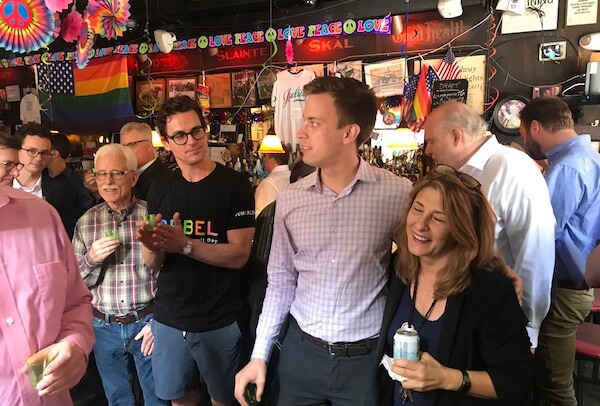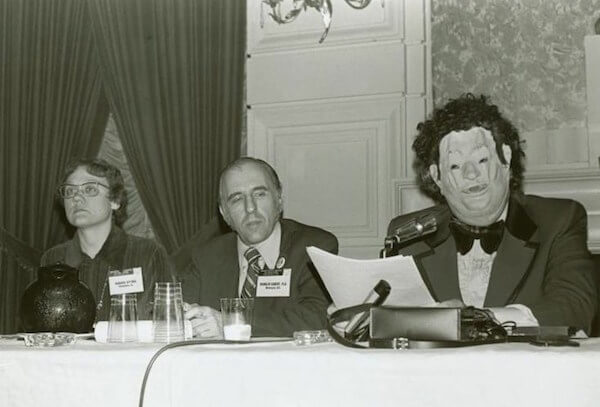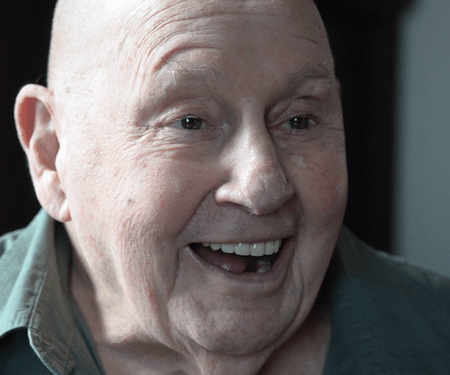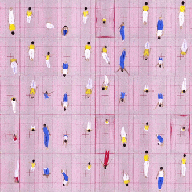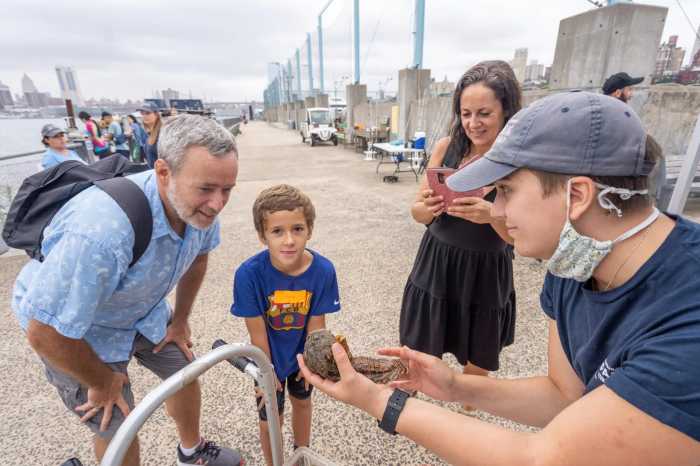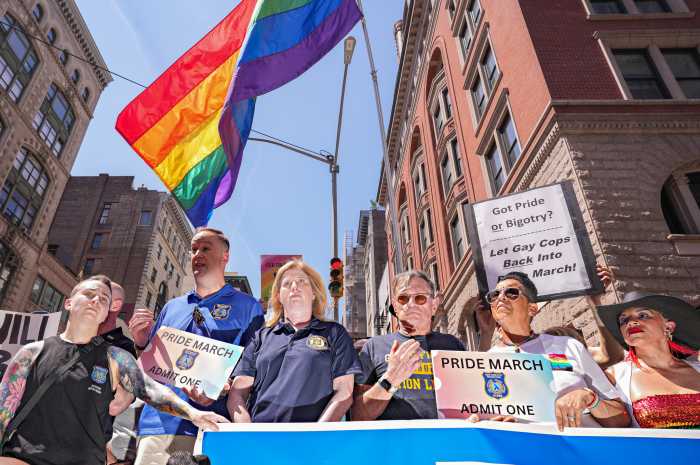Israel Gay Youth's Avner Dafni and Irit Zvieli-Efrat of Hoshen. | GAY CITY NEWS
Following a two-hour event at the Lesbian, Gay, Bisexual & Transgender Community Center, Arthur Slepian, the founder and executive director of A Wider Bridge, explained why he thought it was important to bring a pro-Israel perspective to the queer community.
“I felt like, particularly for LGBT Jews, Israel had become something that we just argue about,” Slepian told Gay City News. “That was particularly distressing to me because there is this amazing LGBT community in Israel.”
The three-year-old group has held events in Seattle, in and near San Francisco, and in Washington, DC. This was its first, though not its last, major New York City presentation. The organization was barred from the Center because of a moratorium imposed in 2011 on renting space to groups that “organize around the Israeli-Palestinian conflict.”
That moratorium was lifted on February 15.
“We think that engagement and dialogue is better than silence,” Slepian told the crowd of over 100 people at the start of the March 17 event.
In freighted debate over “pinkwashing,” A Wider Bridge offers insight into LGBT progress in Jewish state
“We have a really special opportunity tonight to learn about life in Israel for LGBT people,” Slepian said. “The country has evolved a lot over the past several decades.”
The evening began with a screening of “Gay Days,” a 2009 documentary that traces the growth of what is now a vibrant queer community in Israel. The 70-minute film has elements that are reminiscent of the gay community’s history in America.
It tells the story of Uzi Even, a chemistry professor at Tel Aviv University who was fired from his government work after he came out of the closet. Even’s story looked like Frank Kameny’s tale of being dismissed from his federal government job in the US in 1957 after his sexual orientation was disclosed. Like Kameny, Even fought the government.
There is the story of Yossi, a young gay man who was physically abused by his father and rejected by his mother. With no place to turn, Yossi made a desperate phone call to Even. The professor and his partner, Amit Kama, became foster parents to Yossi in 1995 and were finally allowed to legally adopt him in 2009. Yossi’s story would be all too familiar to the clients and staff at any US agency serving queer youth.
Even and Kama, who married in Canada in 2004, were the first gay couple to be recognized as a foster family by the Israeli government. Though not mentioned in the documentary, which ends its history in 2000, Even became the first openly gay person elected to the Knesset, Israel’s parliament, in 2002.
The film does discuss Michal Eden, an out lesbian who became the first queer person to gain any elected office in Israel when she won a seat on the Tel Aviv City Council in 1998.
Israel has a national law that bars workplace discrimination based on sexual orientation, and it allows open service in its military. Same-sex couples can adopt in Israel. While the government recognizes marriages between gay and lesbian couples performed elsewhere, those couples cannot marry in Israel.
While detractors may dismiss these stories as pinkwashing, “Gay Days” presents them as hard-won victories that were achieved by queer activists in Israel and not as government gifts handed out to portray the Jewish state as modern and to distract from its actions in the Israeli-Palestinian conflict.
A Wider Bridge takes its events to US colleges, sponsors trips to Israel, and brings Israeli queer leaders and activists to speak in the US, Slepian said.
The March 17 program featured Irit Zvieli-Efrat, the chief executive officer of Hoshen, a gay group, and Avner Dafni, executive director of Israel Gay Youth, which has operations in 21 Israeli communities.
The problems they confront are identical to those that any US-based gay non-profit experiences –– winning the hearts and minds of the public, getting funding, battles with the closet, and conservative religious opponents who have influence in the halls of power.
Zvieli said that advancing the community’s interests in Israel relied on authentic stories of the community to counter anti-gay perceptions Israelis may hear or have.
“They would hear another story,” she said. “It all connects together the personal story… In the last 10 years, the LGBT community got very present.”
While Tel Aviv is a gay center of sorts in Israel, like the US, there remain parts of the country that are very conservative and not welcoming for gay Israelis.
“It’s still very difficult to be a gay kid in Afula,” Dafni said, referring to a small city in northern Israel where his group operates.
While it seemed that the queer community in Israel was on a path to wider acceptance, it was shocked by a 2009 shooting in a gay center in Tel Aviv that killed two and wounded 15 others.
“We realized there is still a lot of work to do,” Dafni said.
Zvieli shared that view.
“Homophobia is like cancer,” she said. “If you don’t catch it while it’s small, it can blow you in the face.”


